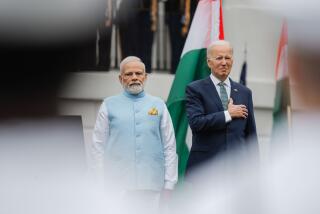The wrong India deal
- Share via
This week’s visit to Washington by Indian Prime Minister Manmohan Singh solidified relations between two democracies too often estranged in earlier decades. But President Bush took the wrong path to a desirable goal, bowing to India’s requests for assistance in developing nuclear energy but getting nothing in return, a reversal of long-standing U.S. policy on stopping the spread of nuclear weapons. Luckily, Bush alone cannot make the agreement reality.
India first tested a nuclear weapon in 1974; its next test explosion came in May 1998. Neighbor Pakistan, which has fought three wars with India and had developed its own nuclear weapon, quickly matched the second test. India has a better record of nuclear responsibility than Pakistan, where physicist A.Q. Khan helped North Korea, Iran and Libya with designs for nuclear weapons.
So if Pakistan comes seeking equal treatment, the answer should be unequivocally “no.” That does not mean India should prevail.
Neither Pakistan nor India has joined in the 1970 Nuclear Nonproliferation Treaty, which has been signed by more than 180 nations. The pact is intended to stop the spread of nuclear weapons while allowing civilian nuclear development, with inspections by the International Atomic Energy Agency.
Unfortunately, it has become a political flashpoint. The treaty is reviewed by its signatories every five years, and this year’s examination at the United Nations was a disaster:
The U.S. sought help in pressuring North Korea and Iran to dismantle their weapons or abandon plans to develop them; Egypt demanded that Israel’s nuclear status be a topic; and Washington was roundly criticized for not committing to reduce its weapons stockpile. The quarrels should have persuaded the U.S. to take steps to improve the treaty, not shrug at India’s weapons.
One Indian concession to Bush was to allow outside inspections of its civilian nuclear facilities, yet it barred access to its military facilities, where new weapons development would most likely take place. New Delhi’s agreement not to conduct more tests or sell nuclear technology or material to others only continues promises made years ago.
Congress would have to amend U.S. laws on nuclear nonproliferation to let Bush’s plan take effect, and it should simply decline to act. The nonproliferation treaty isn’t foolproof: Iran has hidden its nuclear progress and North Korea withdrew from the pact at the end of 2002. But it is a help in reinforcing the decisions of countries such as Argentina, Brazil, South Africa, Japan and Germany against developing atomic weapons.
To carry out its deal, the U.S. would also need help from the 43 other countries in the so-called Nuclear Suppliers Group, which supplies nuclear technology to nations complying with the nonproliferation treaty. These nations surely understand that if they agree to a U.S.-India pact, Pakistan, Iran and North Korea would seek equal treatment.
Yes, Washington could benefit strategically from a strong, nuclear-armed Asian counterweight to China, as well as profit from selling nuclear technology and conventional weapons to India. But risking the further spread of nuclear weapons is too high a price.
Better to cement relations with increased trade and military cooperation, as well as U.S. support for an Indian seat on the U.N. Security Council.
More to Read
Sign up for Essential California
The most important California stories and recommendations in your inbox every morning.
You may occasionally receive promotional content from the Los Angeles Times.













